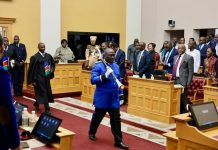Africa-Press – Namibia. HIGHT Court Acting Judge Collins Parker has struck down an urgent application brought by suspended president of the Mine Workers Union (MUN), Ismael Kasuto, its vice president, Densley Somseb, and northern regional secretary, Jessica Haradoes. The trio was removed from the MUN following allegations of fraud and other irregularities.
Kasuto and Somseb were suspended following a vote of no confidence at a meeting held on 28 April. Kasuto is accused of illegally withdrawing N$250,000 from the Namibia Miners Investment Trust (NAMIT), founded by MUN, while Somseb stands accused of changing the trust founder’s deed from MUN to his own name, an action deemed tantamount to commercial fraud and theft.
In the founding affidavit, the applicants contended that their suspension from MUN was unlawful and argued that if the respondents were not stopped from their illegal conduct, they would continue to cause irreparable harm to MUN. They also said that the suspension prevented them from performing their elected duties, thus denying them their right to serve.
In his ruling, Judge Parker said that the application was refused for lack of urgency and struck from the roll.
“At the root of the instant proceeding are allegations of failure by the respondents to comply with certain provisions of the Constitution of the Mineworkers Union of Namibia (MUN). The applicants, represented by Mr. Narib, have approached the court for relief as entitled under section 62 of the Labour Act. However, whether the court should hear them in the normal course in terms of the relevant provisions or on the basis of urgency in terms of rule 6(24) of the Labour Court Rules (‘the rules’) is another issue. The respondents, represented by Mr. Namandje (assisted by Ms. Alexander), have moved to reject the application,” Parker said.
He added that the applicants sought court intervention on the basis of urgency in terms of rule 6(24).
“In the instant proceedings, the cause of action, namely the alleged failure by the respondents to comply with the Constitution of MUN, arose on or about 11 May 2024. In the founding affidavit, the applicants have not provided a satisfactory and sufficient explanation for waiting eight full days before bringing the instant application for largely declaratory orders, thereby dragging the respondents at incredible speed to meet the case. For instance, the applicants have not established that the matter is complex, requiring extensive research for the preparation of the applicants’ founding affidavit and resulting in the filing of long affidavits and confirmatory affidavits with voluminous annexures,” Judge Parker said.
He added that consequently, he finds and holds that the applicants have failed to explicitly set out the circumstances that they claim render the matter urgent.
“The applicants have failed to establish the requirement prescribed by rule 73(4)(a). For this reason alone, the application stands to be struck from the roll, because it is trite that the twin requirements prescribed in paragraphs (a) and (b) of rule 6(24) must be satisfied together and at the same time. Mr. Namandje submitted that the applicants have failed to show why they claim they could not be afforded substantial redress at a hearing in due course. The respondents bear no onus to prove why the matter should not be heard as an urgent application, within the meaning of rule 6(24) of the rules,” Judge Parker said.
He concluded that the fact that the respondents are allegedly committing illegal acts in violation of the Constitution of MUN does not, on any legal scales, satisfy the requirement under rule 6(24)(b) of the rules.
For More News And Analysis About Namibia Follow Africa-Press






